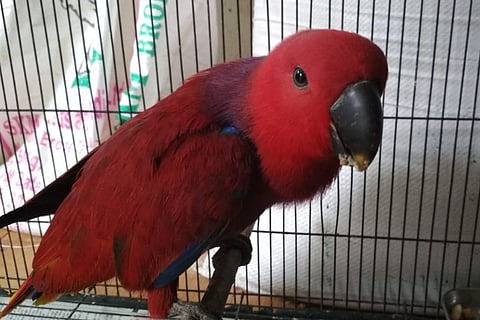

On Sunday, customs officials at the Chennai airport seized dozens of exotic animals including a red squirrel, kangaroo rats, prairie dogs and blue iguanas. The bust, although not unusual for authorities, revealed these endangered species hidden away inside chocolate containers, gift boxes and clothes in a suitcase. 28-year-old Mohammed Mohideen, who had landed in the city from Bangkok, Thailand was fined by the customs officials. Similarly, in October this year, the Directorate of Revenue Intelligence (DRI), Chennai, busted an international syndicate of exotic wildlife smugglers and seized around 100 different species of foreign birds and animals including, Scarlet Macaw, Harlequin Macaw, Squirrel Monkey and Callithrix Monkey following raids on farm houses.
While customs officials regularly arrest persons under the Wildlife (Protection) Act and Customs Act, activists allege that many of the big name traffickers— including businessmen and celebrities — are frequently let off the hook.
Meanwhile, wildlife enthusiasts and pet keepers say that the government must act to regulate private keeping of these animals as opposed to attempting a ban on them. This, in order to enable the guarding and revival of endangered species.
The fascination for exotic animals as pets
Speaking to TNM, animal rights activist Antony Rubin says that the rarity of the endangered species itself maybe an attraction for many. “It's the fascination to have something rare which no one else has. People generally want something special as a pet, especially when it is a non native species in these parts,” he explains. Another factor, he believes, is celebrities’ influencer effect over people. “Singers and actors are often seen with such animals, they post pictures with them. This makes people want to imitate that lifestyle and get themselves these exotic pets,” says Antony.
In 2006, soon after actor Madhavan was voted PETA's "cutest vegetarian," the actor defended owning an African parrot. “I'm aware of the laws against keeping wild animals at home. And, yes, I do have an African parrot at home. But I took that parrot under my wing after its original owners abandoned it. If I had left it out, it would've been eaten by crows. And the parrot is like my son. It isn't caged. It runs around the house freely,” he had said at the time. However, Antony points out that instances such as these lead people to aim for the same lifestyle which means seeking illegal routes to acquire certain animals as pets.
Health hazard, stricter rules
Customs officials, meanwhile, say that there is no way to stop people from wanting these pets. “All we can do is crack down on such cases so that it is not illegally smuggled into the country,” one official tells TNM on the condition of anonymity. However, it has been pointed out that many of the exotic species frequently smuggled are neither covered under the Wildlife Act nor the Convention on International Trade in Endangered Species of Wild Fauna and Flora (CITES). They are technically not banned for trade, thus letting smugglers off the hook.
The customs official admits that the rules require re-examination. Explaining the need to expand the list, he says, “Beyond the wildlife concerns that activists have, our concern is also that the endangered species from the wild may pose a serious health hazard to the population. When they are smuggled in, even the carrier and officers who spot the suspicious luggage are at a serious risk. When such animals are exposed to the population, they may spread viruses that could bring new diseases for which we are not prepared,” he says.
Need for regulation
Speaking to TNM, one pet keeper, on the condition of anonymity, says that there must be a middle ground between banning the private ownership of rare and endangered species and allowing it unabated.
“There needs to be regulation. If the government finds that the pet keeper has procured the animal through a proper channel and treated it in a proper way then it should allow them to keep the pet after a thorough background check. Not all pet keepers are bad. In fact, private pet keeping has helped revive species from the brink of extinction in many parts of the world. There needs to be a balanced outlook on this,” says the pet keeper.
He argues that red tape has forced even genuine animal lovers to seek illegal routes to acquire these animals. “Granting of a license takes ages since even basic surveys of level of endangered animals are yet to be conducted by the government. They don't know what is native and non-native to us so they don't have enough information to issue a license,” he says.
However, he acknowledges that amateur pet ownership has also led to non-native species being released into the wild by people. The pet keeper says, “Keeping these animals as pets is not the sole reason for their disappearance in the wild. We must also address issues such as habitat loss and trophy hunting. Pet keepers account for a very minimal amount of the overall reason for this. Regulations would also mean barring animals that are truly wild and caught solely for this purpose.”